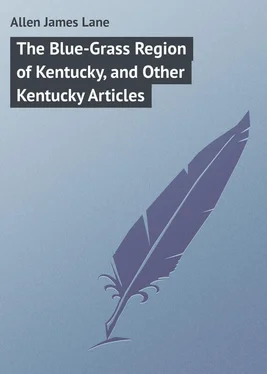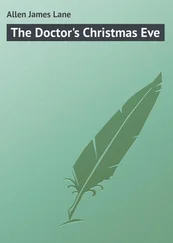James Allen - The Blue-Grass Region of Kentucky, and Other Kentucky Articles
Здесь есть возможность читать онлайн «James Allen - The Blue-Grass Region of Kentucky, and Other Kentucky Articles» — ознакомительный отрывок электронной книги совершенно бесплатно, а после прочтения отрывка купить полную версию. В некоторых случаях можно слушать аудио, скачать через торрент в формате fb2 и присутствует краткое содержание. Жанр: foreign_prose, Путешествия и география, на английском языке. Описание произведения, (предисловие) а так же отзывы посетителей доступны на портале библиотеки ЛибКат.
- Название:The Blue-Grass Region of Kentucky, and Other Kentucky Articles
- Автор:
- Жанр:
- Год:неизвестен
- ISBN:нет данных
- Рейтинг книги:3 / 5. Голосов: 1
-
Избранное:Добавить в избранное
- Отзывы:
-
Ваша оценка:
- 60
- 1
- 2
- 3
- 4
- 5
The Blue-Grass Region of Kentucky, and Other Kentucky Articles: краткое содержание, описание и аннотация
Предлагаем к чтению аннотацию, описание, краткое содержание или предисловие (зависит от того, что написал сам автор книги «The Blue-Grass Region of Kentucky, and Other Kentucky Articles»). Если вы не нашли необходимую информацию о книге — напишите в комментариях, мы постараемся отыскать её.
The Blue-Grass Region of Kentucky, and Other Kentucky Articles — читать онлайн ознакомительный отрывок
Ниже представлен текст книги, разбитый по страницам. Система сохранения места последней прочитанной страницы, позволяет с удобством читать онлайн бесплатно книгу «The Blue-Grass Region of Kentucky, and Other Kentucky Articles», без необходимости каждый раз заново искать на чём Вы остановились. Поставьте закладку, и сможете в любой момент перейти на страницу, на которой закончили чтение.
Интервал:
Закладка:
The good in human nature is irrepressible. Slavery, evil as it was, when looked at from the remoteness of human history as it is to be, will be adjudged an institution that gave development to certain noble types of character. Along with other social forces peculiar to the age, it produced in Kentucky a kind of farmer, the like of which will never appear again. He had the aristocratic virtues: highest notions of personal liberty and personal honor, a fine especial scorn of anything that was mean, little, cowardly. As an agriculturist he was not driving or merciless or grasping; the rapid amassing of wealth was not among his passions, the contention of splendid living not among his thorns. To a certain carelessness of riches he added a certain profuseness of expenditure; and indulgent towards his own pleasures, towards others, his equals or dependents, he bore himself with a spirit of kindness and magnanimity. Intolerant of tyranny, he was no tyrant. To say of such a man, as Jefferson said of every slave-holder, that he lived in perpetual exercise of the most boisterous passions and unremitting despotism, and in the exaction of the most degrading submission, was to pronounce judgment hasty and unfair. Rather did Mrs. Stowe, while not blind to his faults, discern his virtues when she made him, embarrassed by debt, exclaim: "If anybody had said to me that I should sell Tom down South to one of those rascally traders, I should have said, 'Is thy servant a dog that he should do this thing?'"
But there was another person who, more than the master, sustained close relationship to the negro life of the household – the mistress. In the person of Mrs. Shelby, Mrs. Stowe described some of the best traits of a Kentucky woman of the time; but perhaps only a Southern woman herself could do full justice to a character which many duties and many burdens endued with extraordinary strength and varied efficiency.
She was mistress of distinct realms – the house and the cabins – and the guardian of the bonds between the two, which were always troublesome, often delicate, sometimes distressing. In those cabins were nearly always some poor creatures needing sympathy and watch-care: the superannuated mothers helpless with babes, babes helpless without mothers, the sick, perhaps the idiotic. Apparel must be had for all. Standing in her door-way and pointing to the meadow, she must be able to say in the words of a housewife of the period, "There are the sheep; now get your clothes." Some must be taught to keep the spindle and the loom going; others trained for dairy, laundry, kitchen, dining-room; others yet taught fine needle-work. Upon her fell the labor of private instruction and moral exhortation, for the teaching of negroes was not forbidden in Kentucky.
She must remind them that their marriage vows are holy and binding; must interpose between mothers and their cruel punishment of their own offspring. Hardest of all, she must herself punish for lying, theft, immorality. Her own children must be guarded against temptation and corrupting influences. In her life no cessation of this care year in and year out. Beneath every other trouble the secret conviction that she has no right to enslave these creatures, and that, however improved their condition, their life is one of great and necessary evils. Mrs. Stowe well makes her say: "I have tried – tried most faithfully as a Christian woman should – to do my duty towards these poor, simple, dependent creatures. I have cared for them, instructed them, watched over them, and known all their little cares and joys for years… I have taught them the duties of the family, of parent and child, and husband and wife… I thought, by kindness and care and instruction, I could make the condition of mine better than freedom." Sorely overburdened and heroic mould of woman! Fulfilling each day a round of intricate duties, rising at any hour of the night to give medicine to the sick, liable at any time, in addition to the cares of her great household, to see an entire family of acquaintances arriving unannounced, with trunks and servants of their own, for a visit protracted in accordance with the large hospitalities of the time. What wonder if, from sheer inability to do all things herself, she trains her negroes to different posts of honor, so that the black cook finally expels her from her own kitchen and rules over that realm as an autocrat of unquestioned prerogatives?
Mistresses of this kind had material reward in the trusty adherence of their servants during the war. Their relations throughout this period – so well calculated to try the loyalty of the African nature – would of themselves make up a volume of the most touching incidents. Even to-day one will find in many Kentucky households survivals of the old order – find "Aunt Chloe" ruling as a despot in the kitchen, and making her will the pivotal point of the whole domestic system. I have spent nights with a young Kentuckian, self-willed and high-spirited, whose occasional refusals to rise for a half-past five o'clock breakfast always brought the cook from the kitchen up to his bedroom, where she delivered her commands in a voice worthy of Catherine the Great. "We shall have to get up," he would say, "or there'll be a row!" One may yet see old negresses setting out for an annual or a semi-annual visit to their former mistresses, and bearing some offering – a basket of fruits or flowers. I should like to mention the case of one who died after the war and left her two children to her mistress, to be reared and educated. The troublesome, expensive charge was faithfully executed.
Here, in the hard realities of daily life, here is where the crushing burden of slavery fell – on the women of the South. History has yet to do justice to the noblest type of them, whether in Kentucky or elsewhere. In view of what they accomplished, despite the difficulties in their way, there is nothing they have found harder to forgive in the women of the North than the failure to sympathize with them in the struggles and sorrows of their lot, and to realize that they
Конец ознакомительного фрагмента.
Текст предоставлен ООО «ЛитРес».
Прочитайте эту книгу целиком, купив полную легальную версию на ЛитРес.
Безопасно оплатить книгу можно банковской картой Visa, MasterCard, Maestro, со счета мобильного телефона, с платежного терминала, в салоне МТС или Связной, через PayPal, WebMoney, Яндекс.Деньги, QIWI Кошелек, бонусными картами или другим удобным Вам способом.
Интервал:
Закладка:
Похожие книги на «The Blue-Grass Region of Kentucky, and Other Kentucky Articles»
Представляем Вашему вниманию похожие книги на «The Blue-Grass Region of Kentucky, and Other Kentucky Articles» списком для выбора. Мы отобрали схожую по названию и смыслу литературу в надежде предоставить читателям больше вариантов отыскать новые, интересные, ещё непрочитанные произведения.
Обсуждение, отзывы о книге «The Blue-Grass Region of Kentucky, and Other Kentucky Articles» и просто собственные мнения читателей. Оставьте ваши комментарии, напишите, что Вы думаете о произведении, его смысле или главных героях. Укажите что конкретно понравилось, а что нет, и почему Вы так считаете.











